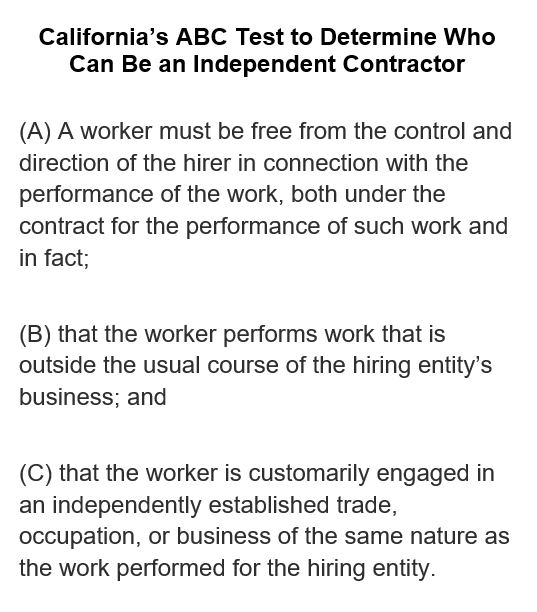The flood of lousy legislation that has poured out of Sacramento for the last two decades or so truly astonishes in its volume. As fourth-rate as the lawmaking has been, though, nothing has been worse than Assembly Bill 5, an existential threat to both jobs and businesses because it requires virtually every worker in the state to be a hired employee.
AB5 is a pit for Californians earning income as independent contractors, and companies that have built their businesses on using freelance workers. Both are losing choices that are theirs, not the Legislature’s, to make.
Making this cruel policy all the more harmful is the fact its damaging effects won’t be limited to Californians. It’s a contagion that’s starting to spread across the country.
For instance, “New Jersey has been cracking down hard on the gig economy, with state regulators and lawmakers both trying to put an end to businesses classifying their  workers as independent contractors,” Reason associate editor Christian Britschgi recently reported.
workers as independent contractors,” Reason associate editor Christian Britschgi recently reported.
The New Jersey Department of Labor and Workforce Development has fined Uber $649 million for unpaid unemployment and disability insurance taxes, says Britschgi. At the same time, a bill that would define all New Jersey workers, outside a few exceptions, as employees has been introduced in the state Senate. New Jersey would use a three-part test based on California’s ABC test to determine who can continue to work as independent contractors. It’s a sharply tilted playing field that makes it nearly impossible for any worker who wasn’t exempted from the law to be classified as an independent contractor.
New York is also “eyeing” legislation similar to AB5, the San Francisco Chronicle says, while “at the national level, Sen. Bernie Sanders,” the socialist from Vermont, “has introduced the Workplace Democracy Plan, which takes a similar approach to AB5.”
While lawmakers elsewhere deliberate the potential of wrecking lives with their gift to the unions, about 2 million Californians who rely on freelance work are anxious. The implementation date is Jan. 1.
 Industries at risk from AB5 are uneasy, as well. Some are pushing back. Uber Technologies Inc., Lyft Inc., and DoorDash, have committed to spending tens of millions of dollars for a 2020 ballot initiative that would take some of the heat out of the bill. Meantime, the California Truckers Association has filed the first legal challenge to the law. Chris Shimoda, vice president of government affairs of CTA, has flat out said more than 70,000 independent truckers will not be able to work under AB5.
Industries at risk from AB5 are uneasy, as well. Some are pushing back. Uber Technologies Inc., Lyft Inc., and DoorDash, have committed to spending tens of millions of dollars for a 2020 ballot initiative that would take some of the heat out of the bill. Meantime, the California Truckers Association has filed the first legal challenge to the law. Chris Shimoda, vice president of government affairs of CTA, has flat out said more than 70,000 independent truckers will not be able to work under AB5.
AB5 is one of the more malicious laws enacted in California in both recent and long-term memory. Yes, some workers celebrated its passage. But the comforts of a few at the expense of the many who have been happy with their occupational choices — and there are many, the Bureau of Labor Statistics finding that “79% of independent contractors preferred their arrangement over a traditional job” — is not a legitimate discharge of lawmakers’ duty. By using their political power to choose winners and losers, they’ve taken California backward yet again, and chances are a good part of the country will join the decline.
Kerry Jackson is a fellow with the Center for California Reform at the Pacific Research Institute.
